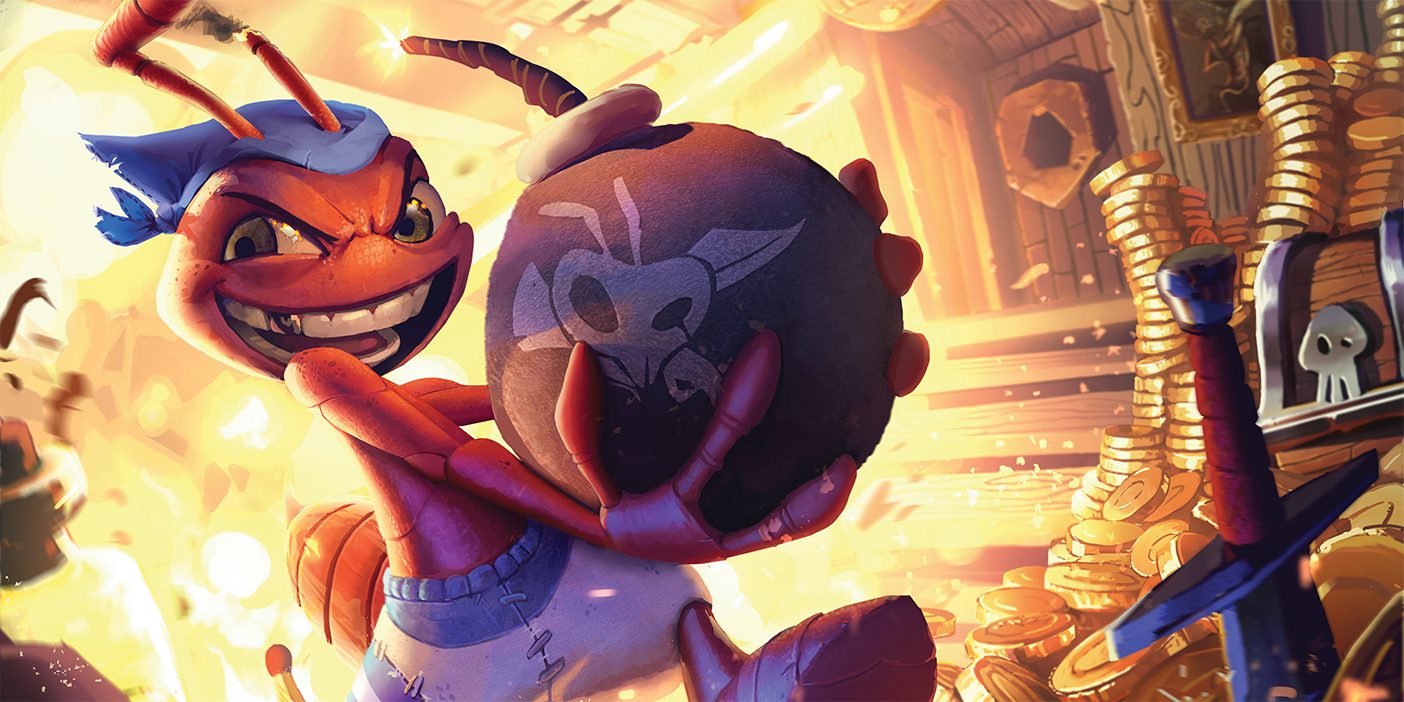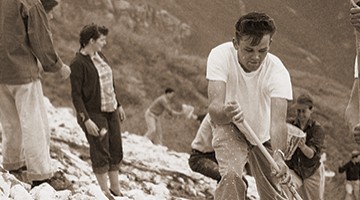Simple Wonder
By Brenda Williams McKenna
Editor’s Note: This essay was the second-place winning entry to the 2004 BYU Magazine student essay contest.
A student partakes of the struggles, progression, and joy available at BYU.
From a young age, I’ve noticed small wonders. I stared right into the eight eyes of a loose tarantula, read books on magic peaches and trumpeter swans, and, at age 4, discovered the joy of scribbling my first name (although my mom suggested I try writing on paper instead of the wall). As a child I found that wonder is generally a simple thing, learned through basic observation and held close for years afterward. It is something of beauty, something of faith, something so subtly powerful it can make people better merely because they’ve caught a glimpse.
Initially I came to BYU expecting less of wonder and more of raw instantaneous change. I wanted intelligent professors and well-cultured friends. I wanted to obtain a British (or possibly Irish) accent while learning to speak Hebrew and read Greek. I wanted to be a doctor, a veterinarian, and an astronaut by turns, and in my hazy early thoughts about college, I imagined it was a place where I would attend class one day and find myself transformed. Never before had I experienced roommates, professors, cooking all my own meals, or paying all my own bills. Never before had I experienced finals or the satisfaction that comes from fixing my own computer hardware. Never before had I dreamed of the heady mixture of cultures and subjects, the subtle influences of the classes I would take and the people I would come to love.
Never before had I fully realized the work, the struggles, and the wonders that would make up my experience at Brigham Young University.
I drove more than 900 miles from Seattle to Provo to live in a closet-like room with a girl I’d never met. The first wonder of my college career came on the day when, after hours of games and movies and talk, I realized that Molli had become more than a roommate—she’d become a friend.
I felt wonder the day I ate ice cream while discussing literature with a professor—and found her charming, personable, and even fun. I discovered relief, after visiting another university over Christmas break, in returning to a dormitory atmosphere that didn’t reek of drugs and alcohol, where I could sleep Saturday mornings without hearing drunken laughter in the halls. Often I noticed the quiet rustle of the trees as I walked through crisp air to microbiology or to International Cinema’s Il Postino or to meet a boy for a date where (strangely enough) he would pay for the dubious privilege of spending an evening with me.
I didn’t feel any different, fundamentally, after those first few months of BYU. And after four semesters I still can’t read an ancient manuscript or talk in a language more complex than basic Spanish. And yet I’ve discovered that statistics can lie and that luck, in science, can lead to the truth. I’ve gained a new appreciation for the words of Chaucer and Shakespeare and Richard Selzer. The most lasting wonders I’ve experienced were in the face of Molli when I cleaned my side of the room or the joy of my future husband when I accepted his proposal on the top of Y Mountain.
BYU’s influence hasn’t rushed through to transform my very being, but I’ve improved all the same—because of challenging courses and worthy friends, the spirit of a testimony meeting in the law building, and the pealing of bells as I exit another devotional. When, in my sophomore year, I started reading Barbara Kingsolver, I realized she’d accurately summarized my university experience when she wrote, “Maybe life doesn’t get any better than this, or any worse, and what we get is just what we’re willing to find: small wonders, where they grow” (“God’s Wife’s Measuring Spoons” Small Wonder: Essays [New York: Harper Collins, 2002] vol. 2, p. 264).
I’m a witness to small wonders and small changes for the better. I’ve seen the struggles, the progression, and the joy possible at BYU. I’ve seen meals given to a young mother who’d lost her child and cookies made for a neighbor “just because.” I’ve seen bookstore bills and ward prayers and the magic of science and music, art and language. And it’s worth it. The initial fear, money, and growing pains are more than outweighed by the progress, learning, and people you meet—the people you come to love. I am a witness that it doesn’t take raw, instantaneous change to make a person better—it merely takes a handful of wonders and a willingness to look up and see. For in looking, in questioning, in reading a few transient words, I’ve caught a vision of what is the stuff of life itself.
And I am better for the glimpse.
A Guy’s Girl In A Women’s Dorm
By TeriLyn Hutcheon, ’07
Editor’s Note: This essay was the third-place winning entry to the 2004 BYU Magazine student essay contest.
For a freshman who was reared among brothers, an all-female dorm can be daunting.
I hate girls. Girls hate me. Growing up with five older brothers I carried this innate belief that I would never get along with girls and would always be a “guys’ girl.” I also felt I understood males better than 99 percent of the female population and was accepted more readily by males because my mind and mannerisms had not been perverted by female manipulations.
I cursed the fact that BYU didn’t offer coed dorms. Plus, the rooms are slightly larger than my bathroom at home, and I’d be sharing a room. No more privacy, but a coinhabited, female-infested closet that I had to call home. And I’d be forced to share a hall with 34 other girls—survival seemed unlikely.
The first thing I noticed was the nauseating nametags on every door. For some reason it really irked me to see my name emblazoned in cutesy calligraphy on a die-cut foot with a polka-dotted background. I entered my cell after a dirty-blonde, big-grinned, overly animated RA unlocked the large, wooden barricade. She wasn’t exactly what I had pictured for a prison warden, but I supposed BYU was merely attempting to conceal its strict system behind peppy young hall advisors.
The first day wasn’t too bad. I spent most of it with my parents and my best friend, Tim, unloading my computer, my dark-maroon bedspread, and my year supply of ibuprofen. After I had crammed everything into my half of the room, I spent the remaining afternoon with the guys: I toured Steve and Danny’s room, visited Ryan’s dorm to mock May Hall’s stench, and ate dinner with Zach. I didn’t meet a single girl that day and had no desire to.
One of the cruelest reminders that I was living with a girl occurred the next day after hours of campus tours and blisters. I unlocked my door to find my roommate—sporting my green American Eagle shirt—flipping through my closet like it was a clearance rack at a Nordstrom sale, hunting for the best bargain. I had never worried about my brothers getting into my things. They never wanted to borrow my clothes, let alone try them on. If they needed something from me, they asked, they borrowed, and they returned it. Now I was being invaded by someone who actually enjoys shopping and was delighted with the new wardrobe at her disposal.
The next day brought New Student Orientation, a fabulously arranged meat-market reminiscent of EFY. Since I alone possessed sanity and never wanted to attend BYU (an attempt to distinguish myself from the typical Utah-female destiny and to maintain kinship in my University of Utah–zealous household), I was content to withdraw from the giddy freshmen and relinquish my name only upon direct inquiry.
Then I met Brooke. We lived in the same hall and were both from Utah. We both felt orientation was a freakishly eager attempt to encourage future engagements and vowed not to be sucked into the grandiose gusto that permeated Provo. My parents laughed when I called that night and told them that the only person I’d exchanged numbers with was a girl. They seemed mildly concerned but excited about the achievement. It wasn’t that I was looking for a boyfriend or the guaranteed “ring by spring,” but my comfort zone required male company. Sure, I had girls whom I called my best friends, but I could count them with my thumbs, and those friendships took years to develop.
The next shock came when Brooke introduced me to her friend Shardae—I liked her too. Shardae and I became workout buddies, party hoppers, and retreated to her house in Provo when the dorm scene got old. I was starting to scare myself: I had met two girls, both of whom I liked. The next day I met more girls on my floor and actually looked forward to chatting with them. I was even excited that my peppy RA was in my aerobics class. She didn’t annoy me anymore—I found her perkiness somewhat entertaining. I no longer was perceiving girls as conniving and phony, but enthusiastic and friendly.
The dating scene changed too. After a date, I came home to six girls wanting details. “What’s he like?” “Is he cute?” Sounds typical, but post-date comments I’d received at home consisted of Jesse questioning, “How long will you like this one? A week?” Roger would add, “He’s a little rich boy. Does he know how to hunt?” Jack always inquired, “He hasn’t proposed yet, right?” My brothers’ remarks would make me laugh, and I didn’t mind their incessant bashing of every guy I dated or merely hung out with. It did bother me that Dean screened all my phone calls, but I didn’t mind the time Dad pulled a shotgun on one of my dates.
I never thought I would enjoy living with girls. I was wrong. I like living with girls almost as much as I loved living with five boys. I miss the roughness and the wrestling matches I always lost. Despite the bruises, I miss the punching contests Roger always won. Now, when I go home, I miss the dorm girls.
I still struggle opening up to girls, but I’m learning that guys are not the only trustworthy people. I still don’t understand why it should ever take longer than 30 minutes to get ready or why three different colors of eye shadow would ever be necessary. It’s a little strange seeing full-length mirrors by the doors instead of a .22 and leather gloves. It’s a little weird hearing squealing more often than belching and having a bruise-free body. But it’s a good weird. I guess girls aren’t so bad after all.









